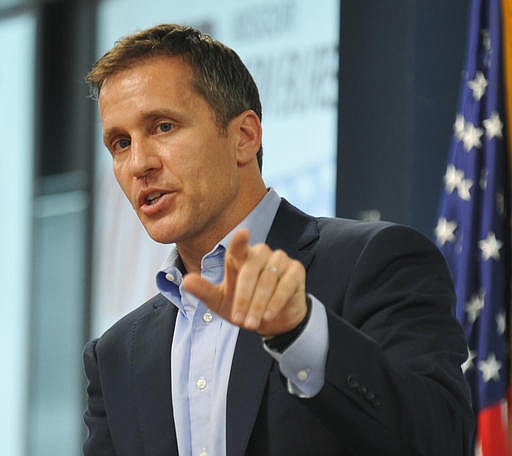JEFFERSON CITY, Mo. (AP) - In his online biography, a campaign video and speeches, Missouri Republican gubernatorial candidate Eric Greitens recounts how he volunteered in Bosnia to help children orphaned or separated from their families by a horrific ethnic war.
But the refugee camps he visited as a college student in summer 1994 actually were in neighboring Croatia. Only in recent years has he increasingly referred to his work as occurring in Bosnia.
The discrepancy in Greitens' description of his past is notable because his gubernatorial campaign against Democratic Attorney General Chris Koster is built largely upon his remarkable resume. He's an Oxford-educated author and public speaker. A humanitarian who has documented the conditions of the downtrodden around the world. And a Navy SEAL officer who survived an attack in Iraq.
Leading up to his victory in the Aug. 2 Republican primary, Greitens stressed his Navy SEAL background with ads showing him shooting large guns and causing a fiery explosion. But he has showcased a softer side since then. His first online video for the general election highlighted his humanitarian efforts, as Greitens declared into the camera: "I went to work in refugee camps in Bosnia."
Asked by The Associated Press why he refers to his refugee work in Bosnia as opposed to Croatia, Greitens replied: "When you think about the violence, people recognize and they understand what happened in Bosnia, and they understand working with Bosnian refugees."
Although Greitens denies any political motivations for his word choice, there nonetheless is a potential political advantage to citing Bosnia instead of Croatia. Missouri has one of the largest Bosnian refugee populations in the world. And to the extent voters remember the fighting in the Balkans, citing Bosnia rather than Croatia probably provokes a stronger sense "that there must have been something heroic going on," said Wayne Fields, a retired English professor from Washington University in St. Louis whose expertise is in political rhetoric.
About 100,000 people were killed in Bosnia during a 1992-1995 war following the collapse of the former Yugoslavia, which had been composed of Bosnia, Croatia, Serbia and several other republics. A United Nations war crimes court recently convicted the former Bosnian Serb leader of genocide against Bosnian Muslims.
As a 20-year-old student at Duke University, Greitens was one of several undergraduates who went to Europe on a summer trip organized by professor Neil Boothby to help evaluate the Unaccompanied Children in Exile aid program. Greitens spent a few weeks at a refugee camp near Pula, Croatia, along the Adriatic Sea, then a few more weeks at a camp near Osijek. Both housed people who had fled from ethnic fighting in Bosnia.
When describing his work during a recent speech to Missouri Farm Bureau members, Greitens said he had been invited by a teacher "to go to Bosnia," and he noted the "vicious campaigns of ethnic cleansing that were happening in Bosnia." Greitens said the experience taught him important lessons about leadership and led him to take future trips to help children in Rwanda, Cambodia and elsewhere.
"Bosnia was challenging," Boothby said in a recent interview with The Associated Press, "but he wasn't close to that, he was in Croatia."
Greitens told the AP that although the "vast majority of the work" was in Croatia, he did enter Bosnian areas for meetings with other international nonprofit groups during a time of fluctuating borders.
Greitens' descriptions of his refugee work appear to have changed over time. Shortly after returning home, Greitens recounted his six weeks in Croatia for an Aug. 9, 1994, story in the St. Louis Post-Dispatch. In 2005, the Duke Chronicle student newspaper similarly quoted Greitens as saying: "When I was working in Croatia... it was extraordinarily safe and far from conflict."
His online biographies also initially included Croatia on the list of places he did humanitarian work. A search of archived internet sites shows that by June 2012, "Croatia" had been replaced by "Bosnia" in biographies on EricGreitens.com and The Mission Continues, a nonprofit group Greitens founded to provide volunteer opportunities for veterans. Although some biographies since then have mentioned Croatia, his current campaign biography lists Bosnia.
The St. Louis area, where Greitens lives, now is home to the largest Bosnian population in the U.S - about 70,000 residents - many of whom arrived as refugees since the 1990s.
"I think he's trying to get the Bosnian community" to support his campaign, said Sadik Kukic, a Bosnian refugee who came to St. Louis in 1993 and now is president of the local Bosnian Chamber of Commerce.
Kukic isn't bothered by Greitens' descriptions of being in Bosnia when he primarily was in Croatia.
"Maybe he messed it up," Kukic said. But "whoever offered any kind of help for these people did a really big thing."
Bosnian refugee Akif Cogo, who is president of the nonprofit St. Louis Bosnians Inc., is similarly forgiving toward Greitens.
"There's definitely a distinction between the two places," Cogo said. But "if he was helping Bosnian refugees in Pula and Croatia, more praise to him, he did a good deed."

